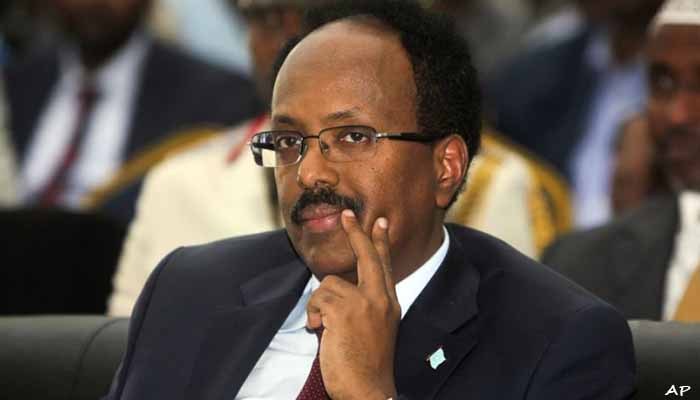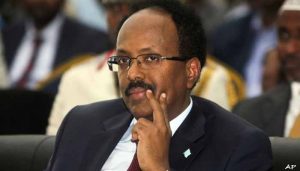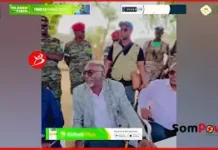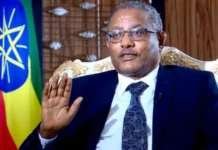
-Ka dib isbadalo nabadeed oo ka dhacay Geeska Afrika oo uu hormood u yahay raysal wasaaraha dalka Itoobiya Dr. Abiy Ahmed ayaa la soo bandhigay doorka uu madaxweynaha soomaaliya ku leeyahay isbadalka.
Warbixin lagu daabacay Alleastafrica ayaa lagu sheegay in madaxweyne Farmaajo uu door muhiim ah ku lahaa wada hadalada u dhaxeeya dawladaha Djibouti Iyo Eritrea, waxaanay warbixintu tilmaantay in madaxweyne Farmaajo uu ka hor yimid dhamaan caqabadihii ka hor iman karayey in labada dal layskugu keeno miiska wada hadalka.
Madaxweyne Farmaajo ayaa la sheegay inuu ku adkaystay in labada dale e deriska ah ee Djibouti Iyo Eritrea ay noqon karaan laba abuurikara xasilooni faa,iido u yeelata gobolka.

Warbixinta ayaa sheegtay in xaalada labada dal ay ahayd mid u baahan in deg deg looga hortago inuu dagaal dhex maro, iyada oo labada hogaamiye ee Djibouti iyo Eritrea ay muujiyeen masuuliyad weyn si loo baajiyo in dhiig daato, iyada oo madaxweyne Farmaajo uu go’aansaday inuu qaato dhinac kasta oo lagu eego in duufaanta isbadalka ee Geeska Afrika ay nabad ka dhex dhaliso labadaas wadan.
Warbixinta ay baahisay Alleastafrica ayaa sidoo kale lagu lafa guray colaada u dhaxaysay labada dal ee Djibouti iyo Eritrea iyo doorkii ay ciidamada Qatar ka qaateen in dagaal culusi uu dhex maro ciidamada labada dawladood.
HOOS KA AKHRI WARBIXINTAN
Eritrea and Djibouti have agreed to normalise ties a decade after a border dispute led to brief military clashes, thanks to mediation weeks of efforts by Somali president Mohamed Abdullahi Mohamed and Ethiopian prime minister Abiy Ahmed.
By John Thiongo, john@alleastafrica.com
NAIROBI – Following his remarkable success in bringing the two East African adversaries of Eritrea and Djibouti together for historic talks, Somali president has been praised for his role as a peace regional mediator.
Buoyed by the ground-breaking recent peace deal between Ethiopia and Eritrea who have finally normalized their long-troubled relations, Mr.Mohamed Abdullahi Mohamed has defied all odds that cast doubt over possibility of bringing the two neighboring archrivals states together, insisting that the two nations could team up for a regional stability instead.
The two countries’ armed forces clashed on the border in 2008. Both states later accepted Qatar’s offer of mediation and the deployment of peacekeepers, though bilateral relations have remained strained leading to the collapse of Qatar’s mediation efforts.
However, failure of Qatar’s attempts to bring the two sides together and the withdrawal of its peacekeeping forces deployed along the disputed border has heightened fears of repeat of conflict between the two countries.
Western and African diplomats haven’t since held out much hope for prospect of peace between the two countries, casting further doubt over whether the two nations would work together again.
It was a situation that required an immediate intervention by leaders with a sense of a shared responsibility to prevent further bloodshed, a role that Mr. Mohamed has decided to take in any case in view of the new storm of change in the region.
He would soon embark on a trip to Asmara, Eritrea’s capital knowing that several previous rounds of negotiations between the two countries have failed.

The capacity of Somalia, an unlikely nation which is still reeling from decades of a bloody conflict to take the lead in mediations efforts to bring leaders of Djibouti and Eritrea together hasn’t grabbed much attention from the onset, with many just referred it as ‘waste of time’.
But president Mohamed had his own plans only known to his inner circles in place and kept the possibility of peace alive with a faith that he could make a difference in the stalemate.
Having received a firm grasp of the contentious issues between the two sides, Somali leader has flown to Eritrea, the first official visit by a Somali leader to the secretive East African nation often referred as the North Korea of Africa in over two decades.
He also became the second president to pay visit to Eritrea which has received Ethiopia’s new reformist prime minister Abiy Ahmed beforehand, a visit which has also herald a new beginning for Ethiopia and Eritrea that have engaged one of the deadliest and longest conflict that killed nearly half a million people.
In his first meeting with Eritrea’s president Isaias Afwerki at a banquet at the state house in Asmara, first talks by the two men have largely focused on bilateral relations between their two countries have not had any formal relationships for nearly two decades.
“Somalia is ready to write a new chapter of its relations with Eritrea,” Somalia’s presidential spokesman Abdinur Mohamed said at the time.
Though the two countries have announced of restoring their relations and signed bilateral agreements, Mr. Mohamed still had one more thing to discuss with Mr. Afwerki: Djibouti-Eritrea relations.
To his surprise, his unwavering push for Eritrea’s compromise in ending the stalemate with Djibouti has yielded immediate success, having secured Eritrea’s acceptance for negotiations.
That was the beginning of a new tough mission for president Mohamed who headed back home to embrace the role of a de-facto mediator.
Despite calling for lifting of sanctions on Eritrea imposed by the United Nations which angered Eritrea’s rival Djibouti, the tiny horn of Africa nation largely seen as a more brotherly nation by Somalis, he kept his diplomatic intentions secret.
He knew that it’s a work that required unflappable patience and ability to ignore any outburst that could come along his way – so he remained steadfast by merely focusing on the underlying issues.
Preparing for a trip to his next destination was the next task. He arrived in Djibouti.

That was not the end. He made more follow-ups with the Eritrean leaders, a major push which has finally paid off on Thursday after Eritrea agreed to send its foreign minister accompanied by his Somali and Ethiopian counterparts to Djibouti to come up with talks’ framework for the first direct talks between the two countries.

“The president’s efforts in ending the conflict between Eritrea and Ethiopia started during the president’s visit to Eritrea.” said Dahir Guelleh, Somalia’s information minister.
“And his trip to Djibouti also helped to make the two sides get closer in principle and proceed further.”
Meanwhile, Somali president’s efforts in helping the two horn of Africa adversaries find common ground in another difficult outside home has earned him massive praise across the region and beyond.
In addition, he is being lauded on social media for how handled the arbitration

















